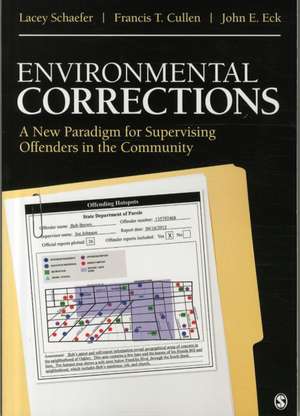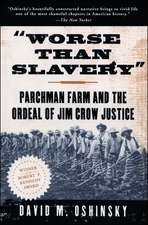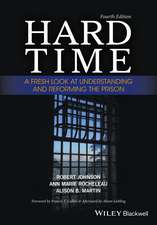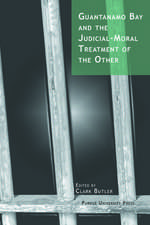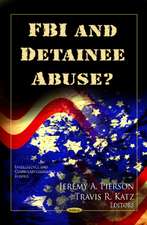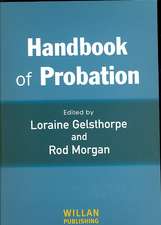Environmental Corrections: A New Paradigm for Supervising Offenders in the Community
Autor Lacey Schaefer, Francis T. Cullen, John E. Ecken Limba Engleză Paperback – 28 dec 2015
Preț: 611.89 lei
Preț vechi: 719.87 lei
-15% Nou
Puncte Express: 918
Preț estimativ în valută:
117.10€ • 127.15$ • 98.36£
117.10€ • 127.15$ • 98.36£
Carte tipărită la comandă
Livrare economică 23 aprilie-07 mai
Preluare comenzi: 021 569.72.76
Specificații
ISBN-13: 9781506323282
ISBN-10: 1506323286
Pagini: 216
Dimensiuni: 178 x 254 x 19 mm
Greutate: 0.41 kg
Ediția:1
Editura: SAGE Publications
Colecția Sage Publications, Inc
Locul publicării:Thousand Oaks, United States
ISBN-10: 1506323286
Pagini: 216
Dimensiuni: 178 x 254 x 19 mm
Greutate: 0.41 kg
Ediția:1
Editura: SAGE Publications
Colecția Sage Publications, Inc
Locul publicării:Thousand Oaks, United States
Recenzii
“For more than a half century, scholars have contested whether offender supervision should emphasize treatment or control. Drawing on the insights of environmental criminology, Schaefer and colleagues move beyond this increasingly stale debate by proposing a truly innovative approach to community corrections: using supervision to limit offenders vulnerability to criminal opportunities. Scholarly yet accessible, this volume promises to be a contemporary classic in the field of corrections.”
“This book breaks important new ground by integrating environmental criminology and
place-based ideas into community supervision of offenders. The idea of "environmental corrections" is not just new and intriguing; it presents a new approach to doing something about an important part of the crime problem.”
“A text like Environmental Corrections is a hot cake in the field of criminal justice, especially in the branch of Corrections. It addresses the whole components of correctional system in a systematic method. It uses a comprehensive approach to explain to readers the environment in which the modern day correction systems operate. By breaking down the theory of correction in Chapter one, the author makes it easier for readers to appreciate the discussions in the Environmental Correction. I believe the use of this book in my correction class would add more flavor in explaining the process of corrections in America.”
“This book has the potential to be for community corrections what Goldstein’s Problem Oriented Policing was and still is for policing.”
“This may well be the most important book on community corrections in decades. It takes a mountain of research evidence from a staggering variety of sources and consolidates it into a roadmap for the future. The ugly truth is that American corrections is broken. Environmental Corrections may well be the approach necessary to repair a critical part of it. The authors have brutally assaulted the mantra that "nothing works" by showing otherwise”.
“It’s an important book – well-written and well-argued. Even though it may ask a lot from probation and parole officers, it certainly provides a standard to aspire to.”
“Strengths: Thoroughness, Inclusion of forms and excellent figures, Practical discussions”
“I would be very likely to seriously consider this as a supplementary text to my Community Corrections class. I also think it would be a good addition to my Police and Community course”
“This book breaks important new ground by integrating environmental criminology and
place-based ideas into community supervision of offenders. The idea of "environmental corrections" is not just new and intriguing; it presents a new approach to doing something about an important part of the crime problem.”
“A text like Environmental Corrections is a hot cake in the field of criminal justice, especially in the branch of Corrections. It addresses the whole components of correctional system in a systematic method. It uses a comprehensive approach to explain to readers the environment in which the modern day correction systems operate. By breaking down the theory of correction in Chapter one, the author makes it easier for readers to appreciate the discussions in the Environmental Correction. I believe the use of this book in my correction class would add more flavor in explaining the process of corrections in America.”
“This book has the potential to be for community corrections what Goldstein’s Problem Oriented Policing was and still is for policing.”
“This may well be the most important book on community corrections in decades. It takes a mountain of research evidence from a staggering variety of sources and consolidates it into a roadmap for the future. The ugly truth is that American corrections is broken. Environmental Corrections may well be the approach necessary to repair a critical part of it. The authors have brutally assaulted the mantra that "nothing works" by showing otherwise”.
“It’s an important book – well-written and well-argued. Even though it may ask a lot from probation and parole officers, it certainly provides a standard to aspire to.”
“Strengths: Thoroughness, Inclusion of forms and excellent figures, Practical discussions”
“I would be very likely to seriously consider this as a supplementary text to my Community Corrections class. I also think it would be a good addition to my Police and Community course”
Cuprins
Chapter 1: Why Offender Supervision Does Not Work
The Invention of Probation and Parole: Treatment and Control
The Limited Effectiveness of Offender Supervision
Why Treatment Does Not Work
Why Control Does Not Work
Conclusion: A New Paradigm for Offender Supervision
Chapter 2: Why Opportunity Matters
The Evolution of Crime Science
Crime Science and Opportunity Reduction
Conclusion: Opportunity-Reduction Supervision
Chapter 3: How to Supervise Offenders
Current Offender Supervision Practices
Introduction to Environmental Corrections Supervision
Identifying Exposure to Crime Opportunities
Considering Gender
Creating the Offender’s Case Plan
Modifying the Offender’s Case Plan
Graduated Consequences
Earned Discharge and Aftercare
Chapter 4: Developing Offender Supervision Technology
Offender Assessment and Classification
Identifying Opportunities for Crime
Opportunity-Reduction Case Plans
Chapter 5: Getting Offenders to Think Right
Reducing Propensity
Opportunity Resistance
Opportunity Avoidance
Chapter 6: How the Police Can Help
Increasing the Supervision of Offenders
Increasing the Supervision of Targets and Places
Increasing the Surveillance by Crime Controllers
Chapter 7: Making Offender Supervision Work
Lesson #1: Punishment Does Not Work Well
Lesson #2: Reducing Crime Opportunities Reduces Crime
Lesson #3: Environmental Corrections Can Reduce Crime Opportunities
Lesson #4: Crime Opportunities Must Be Assessed
Lesson #5: Cognitive-Behavioral Techniques Can Help
Lesson #6: The Police Make Excellent Community Corrections Partners
Lesson #7: Research Is Needed
Lesson #8: Opportunity-Reduction Supervision Can Work
The Invention of Probation and Parole: Treatment and Control
The Limited Effectiveness of Offender Supervision
Why Treatment Does Not Work
Why Control Does Not Work
Conclusion: A New Paradigm for Offender Supervision
Chapter 2: Why Opportunity Matters
The Evolution of Crime Science
Crime Science and Opportunity Reduction
Conclusion: Opportunity-Reduction Supervision
Chapter 3: How to Supervise Offenders
Current Offender Supervision Practices
Introduction to Environmental Corrections Supervision
Identifying Exposure to Crime Opportunities
Considering Gender
Creating the Offender’s Case Plan
Modifying the Offender’s Case Plan
Graduated Consequences
Earned Discharge and Aftercare
Chapter 4: Developing Offender Supervision Technology
Offender Assessment and Classification
Identifying Opportunities for Crime
Opportunity-Reduction Case Plans
Chapter 5: Getting Offenders to Think Right
Reducing Propensity
Opportunity Resistance
Opportunity Avoidance
Chapter 6: How the Police Can Help
Increasing the Supervision of Offenders
Increasing the Supervision of Targets and Places
Increasing the Surveillance by Crime Controllers
Chapter 7: Making Offender Supervision Work
Lesson #1: Punishment Does Not Work Well
Lesson #2: Reducing Crime Opportunities Reduces Crime
Lesson #3: Environmental Corrections Can Reduce Crime Opportunities
Lesson #4: Crime Opportunities Must Be Assessed
Lesson #5: Cognitive-Behavioral Techniques Can Help
Lesson #6: The Police Make Excellent Community Corrections Partners
Lesson #7: Research Is Needed
Lesson #8: Opportunity-Reduction Supervision Can Work
Descriere
Builds on the idea of developing a new paradigm for probation and parole officers to use in supervising offenders
